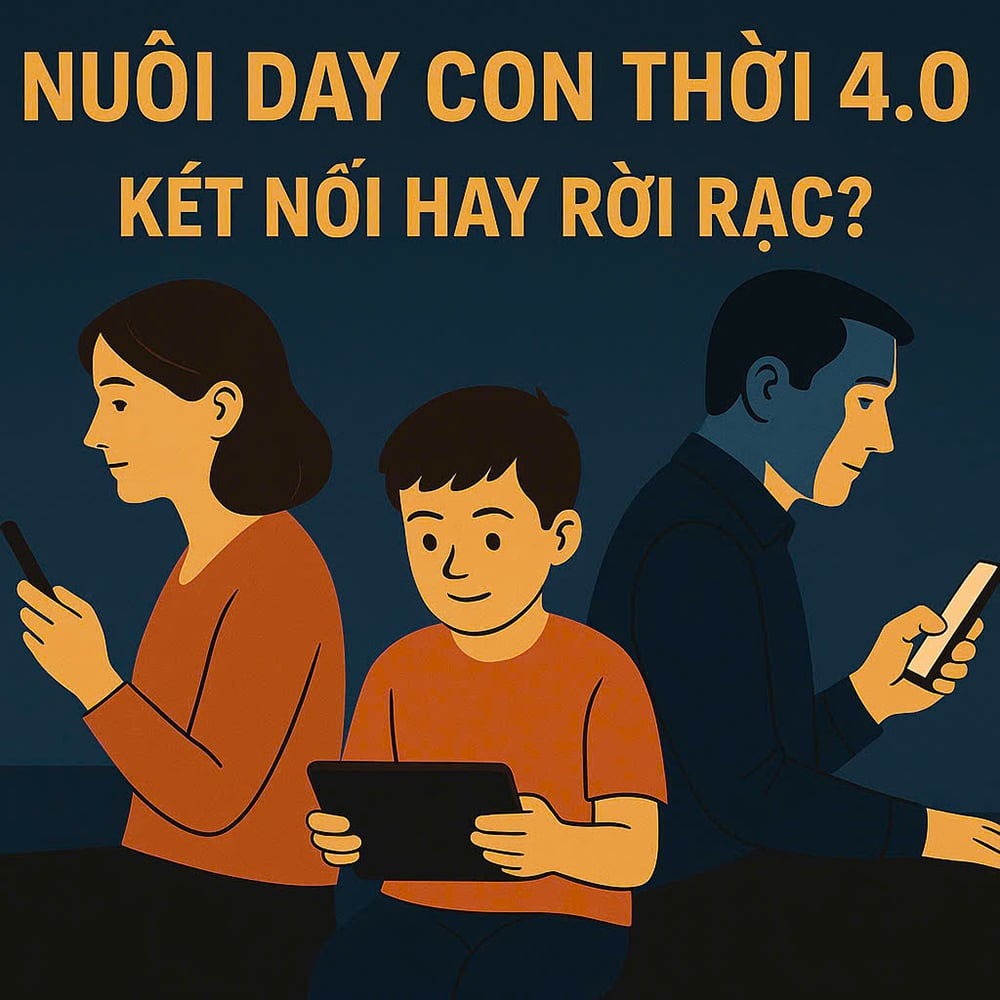Technology is an inevitable trend. Therefore, parents need to choose ways to support their children in the digital world .
Today, raising children is not just about providing meals, ensuring they get enough sleep, or instilling moral values; it also includes guiding them to live in a digital environment – one that connects people and machines. In this context, the question arises: can technology help parents and children connect more closely, or can it create an invisible disconnect between family members?
Technology has opened up unprecedented opportunities for connection. For example, busy mothers can use health tracking apps to monitor their children's sleep and exercise habits; websites and open educational resources from the Ministry of Education and Training provide parents with additional resources to support their children's learning journey. Simultaneously, YouTube Kids offers numerous online lessons, skills courses, educational videos, and language learning apps like Duolingo, which have become effective tools to support children's learning.
Undeniably, using technology correctly can make parenting easier and more effective. However, the current technological advancements have created a familiar scene in many modern families: parents and children sitting at the dinner table, each holding a device such as a phone, laptop, or iPad, their eyes glued to the screen. Meals are devoid of laughter and conversation, replaced by the sound of scrolling and indifferent nods.
Several survey results show that children aged 6-12 spend an average of more than 4 hours a day in front of screens, not including online learning time. Meanwhile, the time spent interacting directly with parents is less than 30 minutes a day. Many children say their parents are "always busy" or "only text instead of talking." There are numerous cases of children becoming addicted to games, depressed, or even developing behavioral disorders due to a lack of genuine connection within the family and the uncontrolled overuse of technology.
Ms. Lam Thi Truc (residing in Long Xuyen City) shared: “Many parents think that equipping their children with modern devices, online learning, and participating in online classes is enough to show their care. But technology cannot replace the love, presence, and listening of loved ones, especially parents. What a child needs most is not an iPad or a smartphone, but the warm hug of their parents when sad, the understanding look in their eyes when they stumble, and words of encouragement when they are discouraged. When technology becomes a “babysitter” or “conversation companion” instead of parents, that is when the connection between parents and children gives way to a disconnect in family relationships.”
Technology is an inevitable trend, so children's access to technology is unavoidable. Therefore, parents need to choose ways to accompany their children in the digital world. The important thing is not to separate technology from family life, but to create quiet moments, technology-free times, where parents and children can truly connect emotionally and with full presence. Many experts recommend that each family establish "screen-free time," perhaps during meals, a weekend evening, or on outings, to connect with each other. In particular, parents need to master technology instead of being swept away by it. When real presence is prioritized over virtual interactions, and when emotions and sharing become the bridge, technology becomes a companion that connects parents and children instead of a divisive force. At the same time, it helps children recognize the values around them in daily life and discern right from wrong. Guide and equip children with the skills to cope with negative impacts from the online environment, helping them develop a "filter" against both online and offline harm.
MY LINH
Source: https://baoangiang.com.vn/nuoi-day-con-thoi-4-0-a421714.html



![[Photo] Announcement Ceremony of the Art Program “Light Concert – Welcoming the New Year 2026”](/_next/image?url=https%3A%2F%2Fvphoto.vietnam.vn%2Fthumb%2F1200x675%2Fvietnam%2Fresource%2FIMAGE%2F2026%2F01%2F27%2F1769514762857_le-cong-bo-ct-hoa-nhac-anh-sang-1772-9042-jpg.webp&w=3840&q=75)


![[Photo] Commemorating the unwavering friendship between Vietnam and Laos](/_next/image?url=https%3A%2F%2Fvphoto.vietnam.vn%2Fthumb%2F1200x675%2Fvietnam%2Fresource%2FIMAGE%2F2026%2F01%2F27%2F1769518372051_ndo_br_1-jpg.webp&w=3840&q=75)


















































![[Hightling] Conference on the Implementation of Tasks for 2026](/_next/image?url=https%3A%2F%2Fvphoto.vietnam.vn%2Fthumb%2F402x226%2Fvietnam%2Fresource%2FIMAGE%2F2026%2F01%2F27%2F1769477856197_dsc01637.jpeg&w=3840&q=75)




























![OCOP during Tet season: [Part 2] Hoa Thanh incense village glows red.](/_next/image?url=https%3A%2F%2Fvphoto.vietnam.vn%2Fthumb%2F402x226%2Fvietnam%2Fresource%2FIMAGE%2F2026%2F01%2F27%2F1769480573807_505139049_683408031333867_2820052735775418136_n-180643_808-092229.jpeg&w=3840&q=75)
![OCOP during Tet season: [Part 1] Ba Den custard apples in their 'golden season'](/_next/image?url=https%3A%2F%2Fvphoto.vietnam.vn%2Fthumb%2F402x226%2Fvietnam%2Fresource%2FIMAGE%2F2026%2F01%2F26%2F1769417540049_03-174213_554-154843.jpeg&w=3840&q=75)








Comment (0)